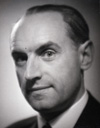The NBS Archives are open to the public at the following times:
Tuesday, Wednesday and Thursday
9 a.m. to 12 noon /
12:45 p.m. to 3 p.m.
In July, August and September the Archives are closed to the public.
Jozef Fundárek
 (*01 October 1896 in Bytča – †17 August 1991 in Bratislava)
(*01 October 1896 in Bytča – †17 August 1991 in Bratislava)
From 1 April 1925 he acted as secretary and from the end of 1936 until April 1939 as secretary-general of the Bratislava Stock Exchange. In February 1939, at the proposal of the Slovak Government, he was appointed a member of the Bank Board and deputy governor of Národná banka Československá. By mid-March 1939 he already served as a Representative of the Slovak Government in central bank matters and at the same time, he headed a group of experts who actively participated in the preparatory work related to the establishment of Slovenská národná banka, where he was appointed deputy governor. When Governor Imrich Karvaš was appointed chairman of the Supreme Office for Supplies in 1942, Fundárek was temporarily placed in charge of the bank's management. Fundárek supported the steps taken by Imrich Karvaš to help prepare for the Slovak National Uprising, namely the concentration of currency and parts of the precious metal stocks in the branch of Slovenská národná banka in Banská Bystrica. He was involved in organizing the transfer of monetary gold reserves to the Swiss National Bank, thereby saving them from being dragged away to Germany. He was dismissed from his post on 14 March 1945.
From August 1940 until the end of December 1941 he was a Member of the State Council and in the same year he was co-opted to the Assembly of the Slovak Republic as a legal expert for committee work (chairman of the Immunity Committee, vice-chairman of the Constitutional Law Committee, member of the National Economic Committee). At that time, he also acted as a chairman or member of management boards and supervisory committees of several banks, businesses, national economic institutions and as a member of examination boards and education advisory councils.
After 1945 he was persecuted. In the “Action B” campaign of 1952, he was forbidden to live in Bratislava. After his return to the capital, he worked as a pensioner first at the Municipal Museum and later in the Regional Library and in the years 1970 – 1976 again in the Municipal Museum, with his focus being the history of Bratislava and numismatics.


